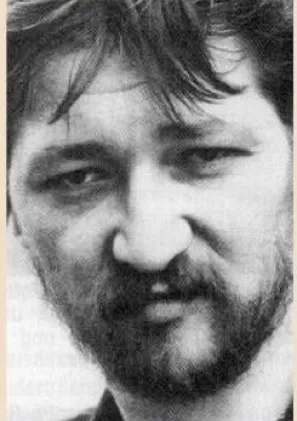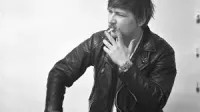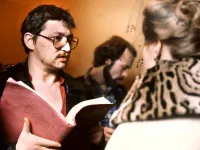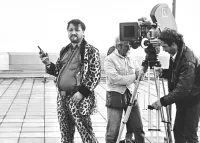Biography
1945 - 1982
"It isn't easy to accept that suffering can also be beautiful... it's difficult. It's something you can only understand if you dig deeply into yourself."
- Werner Fassbinder
At 15, he announced he was gay, left school, and joined a theatrical troupe. In the course of 18 months he directed 12 plays and soon after began making films. By 1976 he had gained international prominence. Fassbinder was a German filmmaker involved in all facets of the medium. He is considered the most important representative of the New German Cinema; so much so that his death typically marks the conclusion of that movement. Known as the "enfant terrible" of 70s cinema, he was characterized by his leather jacket, battered cap, sunglasses, and perpetual scowl. Wildly self-destructive, he fueled himself with drugs and worked at a frenetic pace. In 15 years he directed over 40 films (many he also wrote, edited, and designed), completed 2 television series, 3 short films, 4 video projects, 24 stage plays, 4 radio plays, and had 36 acting roles in other people's films. Though married twice, Fassbinder made no secret of the male lovers he had throughout his life. Through this lens, his films were art house fixtures, frequently exploring society’s deep-rooted prejudices on race, gender, sexual orientation, and class. Profoundly controversial, his work regularly received wildly mixed reviews and he was sporadically accused of misogyny and even homophobia. His most notable films include 'The Marriage of Maria Braun', 'Querelle', 'Lili Marleen', 'Despair', 'Lola', 'Veronika Voss', and ‘The Third Generation'. At the height of his career – just ten days after his 37th birthday – he died of heart failure from a lethal combination of cocaine and sleeping pills. Found with a cigarette still in his mouth, he’d apparently been watching TV as well as a video, reading, and writing the screenplay for his new film ‘Rosa L’. Having died as chaotically as he lived, Fassbinder remains one of the most influential filmmakers in the history of German Cinema.
1945 - 1982
"It isn't easy to accept that suffering can also be beautiful... it's difficult. It's something you can only understand if you dig deeply into yourself."
- Werner Fassbinder
At 15, he announced he was gay, left school, and joined a theatrical troupe. In the course of 18 months he directed 12 plays and soon after began making films. By 1976 he had gained international prominence. Fassbinder was a German filmmaker involved in all facets of the medium. He is considered the most important representative of the New German Cinema; so much so that his death typically marks the conclusion of that movement. Known as the "enfant terrible" of 70s cinema, he was characterized by his leather jacket, battered cap, sunglasses, and perpetual scowl. Wildly self-destructive, he fueled himself with drugs and worked at a frenetic pace. In 15 years he directed over 40 films (many he also wrote, edited, and designed), completed 2 television series, 3 short films, 4 video projects, 24 stage plays, 4 radio plays, and had 36 acting roles in other people's films. Though married twice, Fassbinder made no secret of the male lovers he had throughout his life. Through this lens, his films were art house fixtures, frequently exploring society’s deep-rooted prejudices on race, gender, sexual orientation, and class. Profoundly controversial, his work regularly received wildly mixed reviews and he was sporadically accused of misogyny and even homophobia. His most notable films include 'The Marriage of Maria Braun', 'Querelle', 'Lili Marleen', 'Despair', 'Lola', 'Veronika Voss', and ‘The Third Generation'. At the height of his career – just ten days after his 37th birthday – he died of heart failure from a lethal combination of cocaine and sleeping pills. Found with a cigarette still in his mouth, he’d apparently been watching TV as well as a video, reading, and writing the screenplay for his new film ‘Rosa L’. Having died as chaotically as he lived, Fassbinder remains one of the most influential filmmakers in the history of German Cinema.
Demography
Demography
Gender Male
Sexual Orientation Gay
Gender Identity Cisgender
Ethnicity Caucasian/White
Nations Affiliated Germany
Era/Epoch Information Age (1970-present)
Field(s) of Contribution
Film
Music
Television
Theater
Commemorations & Honors
German Film Award Best Direction For Warum läuft Herr R. Amok (1971)
German Film Award Best Feature Film For The Merchant of Four Seasons (1972)
British Film Institute Award’s Sutherland Trophy For Martha (1974)
German Film Award Best Direction For Despair (1978)
German Film Award Best Direction For Die Ehe der Maria Braun (1979)
David di Donatello Luchino Visconti Award (1979)
Golden Bear Award For Veronika Voss (1982)
Demography
Gender Male
Sexual Orientation Gay
Gender Identity Cisgender
Ethnicity Caucasian/White
Nations Affiliated Germany
Era/Epoch Information Age (1970-present)
Field(s) of Contribution
Film
Music
Television
Theater
Commemorations & Honors
German Film Award Best Direction For Warum läuft Herr R. Amok (1971)
German Film Award Best Feature Film For The Merchant of Four Seasons (1972)
British Film Institute Award’s Sutherland Trophy For Martha (1974)
German Film Award Best Direction For Despair (1978)
German Film Award Best Direction For Die Ehe der Maria Braun (1979)
David di Donatello Luchino Visconti Award (1979)
Golden Bear Award For Veronika Voss (1982)
Resources
Resources
Appignanesi, Richard. Fassbinder, Mishima, Pasolini. London: Radius, 1989.
Braad Thomsen, Christian. Fassbinder: The Life and Work of a Provocative Genius. trans. Martin Chalmers. London and Boston: Faber and Faber, 1997.
Elsaesser, Thomas. Fassbinder's Germany: History, Identity, Subject. Amsterdam: Amsterdam University Press, 1996.
Katz, Robert. Love Is Colder than Death: The Life and Times of Rainer Werner Fassbinder. New York: Random House, 1987.
Schidor, Dieter. Rainer Werner Fassbinder dreht "Querelle." Munich: W. Heyne, 1982.
Watson, Wallace Steadman. Understanding Rainer Werner Fassbinder: Film as Private and Public Art. Columbia: University of South Carolina Press, 1996.
http://en.wikipedia.org/wiki/Rainer_Werner_Fassbinder
https://www.nytimes.com/1982/06/11/movies/rainer-werner-fassbinder-36-film-maker-dead.html
https://www.jstor.org/stable/488477?seq=1#page_scan_tab_contents
https://www.newworldencyclopedia.org/entry/Rainer_Werner_Fassbinder
http://www.imdb.com/name/nm0001202/bio?ref_=nm_ov_bio_sm
http://gayfortoday.blogspot.com/2007/05/rainer-werner-fassbinder.html
http://www.cinemaqueer.com/review%20pages/fassbinder.html
https://www.gaystarnews.com/article/read-turbulent-high-speed-life-stor…
https://www.out.com/movies/2017/4/28/fassbinders-mirror-how-gay-filmmak…
Resources
Appignanesi, Richard. Fassbinder, Mishima, Pasolini. London: Radius, 1989.
Braad Thomsen, Christian. Fassbinder: The Life and Work of a Provocative Genius. trans. Martin Chalmers. London and Boston: Faber and Faber, 1997.
Elsaesser, Thomas. Fassbinder's Germany: History, Identity, Subject. Amsterdam: Amsterdam University Press, 1996.
Katz, Robert. Love Is Colder than Death: The Life and Times of Rainer Werner Fassbinder. New York: Random House, 1987.
Schidor, Dieter. Rainer Werner Fassbinder dreht "Querelle." Munich: W. Heyne, 1982.
Watson, Wallace Steadman. Understanding Rainer Werner Fassbinder: Film as Private and Public Art. Columbia: University of South Carolina Press, 1996.
http://en.wikipedia.org/wiki/Rainer_Werner_Fassbinder
https://www.nytimes.com/1982/06/11/movies/rainer-werner-fassbinder-36-film-maker-dead.html
https://www.jstor.org/stable/488477?seq=1#page_scan_tab_contents
https://www.newworldencyclopedia.org/entry/Rainer_Werner_Fassbinder
http://www.imdb.com/name/nm0001202/bio?ref_=nm_ov_bio_sm
http://gayfortoday.blogspot.com/2007/05/rainer-werner-fassbinder.html
http://www.cinemaqueer.com/review%20pages/fassbinder.html
https://www.gaystarnews.com/article/read-turbulent-high-speed-life-stor…
https://www.out.com/movies/2017/4/28/fassbinders-mirror-how-gay-filmmak…






